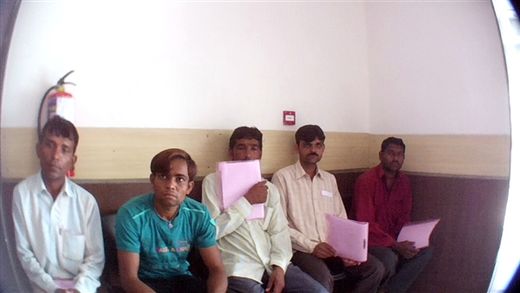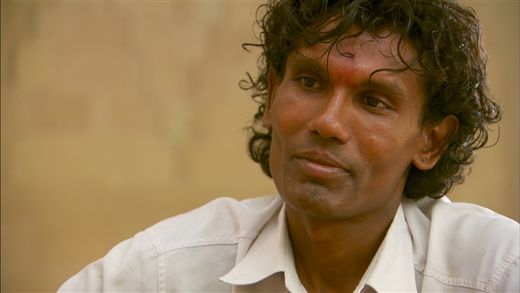
When Indian firms working for pharmaceutical companies need test subjects, they often turn to Nadia, who has carved a small niche for himself as a recruiter in the international drug-testing industry.
"Companies call me or send me text messages," he told Dateline NBC correspondent Chris Hansen.
Self-confident and well-groomed with gelled hair and tight-fitting designer jeans, Nadia said he is paid about $12 for every recruit he brings to the three Indian research labs with whom he works. In a region of western Indian where the average worker earns 50 cents a day, that's good money.
"I don't feel guilty," Nadia said. "I believe conducting these studies is a humanitarian effort. So many people benefit from (the) advancement of medicine."
Drug trial outsourcing to foreign countries is rapidly becoming an attractive alternative for U.S. pharmaceutical companies looking to save millions of dollars, avoid regulatory scrutiny and tap into a seemingly endless supply of drug study participants.
But a year-long Dateline investigation into one of the preferred destinations for overseas drug trials, India, raises questions about lax regulatory oversight in these studies, the integrity of some of the companies contracted to run them and the reliability of the data they produce.
Whether the studies are for birth control, diabetes, migraines or high blood pressure, money often draws volunteers into Indian drug trials. And Nadia said that many of his desperately poor recruits are so eager to enroll that they disregard potential risks.
"They don't regard the smaller side effects," Nadia explained. "Sometimes, people feel weak or get body ache. They don't care about these little things because they need the money."
Dr. Chandra Gulhati, editor of the Monthly Index of Medical Specialties, an Indian medical journal, points out that luring test subjects with money violates India's Drugs and Cosmetics Act. The act allows some payment, but not enough to sway free will.
"It should never be so much that it works as an inducement," Gulhati said.
In practice, however, the pay is often just that. Subjects can make up to $400, depending on the length of the study -- far outstripping traditional earnings.
The financial incentives can lead to study volunteers enrolling in more than one study at a time. That not only puts their lives in danger, but it also can skew the accuracy of test results that drug companies and regulators rely on to judge a drug's safety.
Asked if he was aware of volunteers taking part in more than one study at a time or ignoring "wash-out" rules designed to allow their bodies to be clean of test drugs, Nadia didn't hesitate. "It happens. Lots of people do that."
"Sometimes the subjects have to log into the system through thumbprint readers and sometimes they get caught," he said. "But if (the companies) need the subjects desperately, they will ignore these things."

Parsottam Parmar is a social worker in Ahmedabad's slums who advocates for higher wages and ongoing health care for drug-study participants. He is alarmed by what he is witnessing.
"People keep falling sick," he said. "There are many instances where there are swellings in the limbs, loss of eyesight. Several deaths have occurred ... It becomes a question of human rights -- a big one at that."
The Indian government reports that across the country more than 1,500 people have died in clinical trials since 2008, many participating in studies for Western pharmaceutical companies. Because official documentation of the deaths is frequently incomplete or non-existent, it is unclear how many people died from the same illnesses that initially qualified them for certain drug studies.
Gulhati, the editor of the Indian medical journal, said official inquiries into drug-trial deaths are rare.
"Unlike the Western countries where there is an audit of each death during [a] clinical trial, we don't have a system like that at all," he said. "So that is the biggest problem."
The lack of oversight by Indian government officials, Gulhati added, has created a culture of impunity for drug research companies and the doctors who work for them.
He offered a recent example. In 2010, an Indian government investigation confirmed 10 deaths at drug trials sponsored by Western drug companies, including Pfizer and Astra Zeneca, at the Bhopal Memorial Hospital and Research Centre. The facility was built to treat survivors of the 1984 Bhopal gas disaster.
Gas survivor patients and their families said some of the doctors who enrolled them never informed the patients that they were in drug studies nor did they pay them the requisite compensation. The hospital was paid more than $200,000 to conduct the studies, according to government records.
Gas survivor advocates also claimed that at least one of the 13 studies conducted between 2004 and 2008 appeared to be illegal in India at the time.
The Indian government later cited repeated violations of guidelines and regulations during the trials conducted between 2004 and 2008, but no penalties were issued to the hospital, doctors or study sponsors.
In a warning letter to one company, India's Drugs Controller General Dr. Surinder Singh wrote, "...you are hereby warned to be careful while conducting clinical trials to ensure that such deficiencies/discrepancies are not repeated in the future."
The companies sponsoring the studies said that international standards and Indian laws were followed, though Astra Zeneca acknowledged errors in receiving proper consent from some patients. It said the problem was "promptly corrected."
FDA faces 'handicaps' overseeing foreign trials
Although data from overseas studies is used to help win FDA approval for drugs, the agency told Dateline in a statement that it faces "a number of handicaps in its inspections of foreign clinical sites, which are not technically under FDA jurisdiction under international law."
In India, for example, the FDA said its inspectors are not legally permitted access to confidential records held by contract research firms that often do testing for Western pharmaceutical companies. It's a law that would severely hamper any investigation into a patient's death.
Satinath Sarangi, director of the Bhopal Group for Information and Action, told Dateline that the incentive for drug companies to conduct research in India is obvious.
"You can do it cheaply, do it with no regulation, and even if there are violations, get away with it," he said.
Following reports of unauthorized drug studies on children and mentally disabled patients, India's health minister, Ghulam Nabi Azad, told reporters last month that some companies running drug trials in India are not following regulations.
"Sometimes the companies don't go by the laid-down procedures and it causes great harm to persons and individuals on which this test is carried out," he said.
Even when deaths during drug trials raise questions, drug companies can eliminate those questions at little expense.
Last year, Azad, the Indian health minister, confirmed that 10 foreign drug companies paid an average of about $4,800 to relatives of 22 people who died during or after participating in drug trials in 2010. The amount is a small fraction of compensation paid for similar deaths in other countries, Gulhati said.
In the meantime, reports of illnesses and deaths linked to drug trials are doing little to deter a steady stream of willing volunteers. And Nadia sees no risk to his franchise.
"There is more supply than demand," he said. "There's nothing to feel bad (about). The subjects need the money, so they go. It's as simple as that."



Reader Comments
to our Newsletter